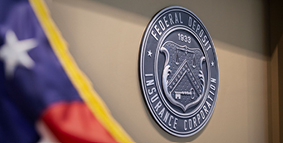
Top five things to know
Deposit insurance from the Federal Deposit Insurance Corporation (FDIC) enables consumers to place their money with confidence at FDIC-insured banks and savings associations (insured banks) across the country. FDIC deposit insurance is backed by the full faith and credit of the United States Government.
Here are some key things to know about deposit insurance:
1. What is covered under deposit insurance and how much?
The FDIC protects the money depositors place in insured banks in the unlikely event of an insured-bank failure. Each depositor is insured to at least $250,000 per insured bank.
FDIC deposit insurance covers all types of deposits held at an insured bank. This includes deposits in a checking account, negotiable order of withdrawal (NOW) account, savings account, money market deposit account (MMDA), certificate of deposit (CD) or other time deposit account, as well as official items issued by an insured bank such as a cashier's check or money order. FDIC insurance covers depositors' accounts at each insured bank, dollar-for-dollar, including principal and any accrued interest through the date of the insured bank's failure, up to the insurance limit.
FDIC deposit insurance covers various types of banking products, including:
| FDIC deposit insurance covers: |
|---|
| Checking accounts |
| Negotiable Order of Withdrawal (NOW) accounts |
| Savings accounts |
| Money Market Deposit Accounts (MMDAs) |
| Certificates of Deposit (CDs) |
| Cashier’s checks |
| Money orders |
| Other official items issued by an insured bank |
2. What is NOT covered?
The FDIC does not insure money invested in stocks, bonds, mutual funds, life insurance policies, annuities or municipal securities, even if these investments are purchased at an insured bank.
| FDIC deposit insurance does not cover: |
|---|
| Stock investments |
| Bond investments |
| Mutual funds |
| Life insurance policies |
| Annuities |
| Municipal securities |
| Safe deposit boxes or their contents |
| U.S. Treasury bills, bonds, or notes |
| Crypto assets |
You should understand the terms and conditions of financial products offered by non-bank companies and how your funds may, or may not, be protected. It is important to be aware that non-bank companies are never FDIC insured. Even if they partner with insured banks, money you send to a non-bank company is not FDIC insured unless, and until, the company deposits it in an insured bank.
FDIC insurance protects you only in the unlikely event the insured bank fails, and does not protect you against losses due to the non-bank company’s bankruptcy or failure to meet its obligations to its customers. A non-bank’s company failure or bankruptcy may result in delays in accessing your money, even when your money was deposited in a bank for your benefit.
3. How to calculate your coverage? EDIE!
FDIC Electronic Deposit Insurance Estimator (EDIE) is an online tool that can be used to determine whether your accounts are fully insured at each insured bank where your deposits are held. EDIE allows you to input dollar amounts you have on deposit in an insured bank or use a hypothetical scenario to determine your coverage.
FDIC does NOT insure non-deposit investment products, such as stocks, bonds, government and municipal securities, mutual funds, annuities (fixed and variable), life insurance policies (whole and variable), savings bonds, crypto assets, etc. EDIE is NOT an estimator for investments (even if the investments were purchased from an insured bank).
4. When and how is deposit insurance paid?
Deposit insurance is paid when an insured bank fails. When this happens, the bank’s chartering authority typically steps in to close the bank and brings in the FDIC as the deposit insurer. FDIC staff is on location the day it fails, working to identify those who have insured money in the bank. In many instances, another bank agrees to buy the failing bank and the transition is smooth for depositors. If there is no immediate buyer, the FDIC maintains access for depositors to their insured deposits.
For more information, go to: When a Bank Fails - Facts for Depositors, Creditors, and Borrowers.
5. I have additional questions about deposit insurance, who can I contact?
The FDIC website has a page of frequently asked questions (FAQs) about deposit insurance. You can also write and receive a response from the FDIC by visiting the FDIC Information and Support Center. If you wish to speak to a deposit insurance specialist, you may call: 1-877-ASK-FDIC (1-877-275-3342).
FDIC is an independent agency of the United States Government that protects you against the loss of your insured deposits if an insured bank fails. FDIC insurance is backed by the full faith and credit of the United States Government. Since the start of FDIC insurance in 1934, no depositor has lost a single cent of insured deposit.
Additional resources
Fact Sheet: What the Public Needs to Know About FDIC Deposit Insurance and Crypto Companies
Understanding Deposit Insurance
Are My Deposits Insured by the FDIC?
FDIC Consumer News: Is the Money on My Prepaid Card FDIC-Insured?
FDIC Consumer News: Avoiding Scams and Scammers
FDIC Consumer News: How Does the FDIC Protect Consumers?
For more consumer resources, visit FDIC.gov, or go to the FDIC Knowledge Center. You can also call the FDIC toll-free at 1-877-ASK-FDIC (1-877-275-3342). Please send your story ideas or comments to ConsumerNews@fdic.gov.
